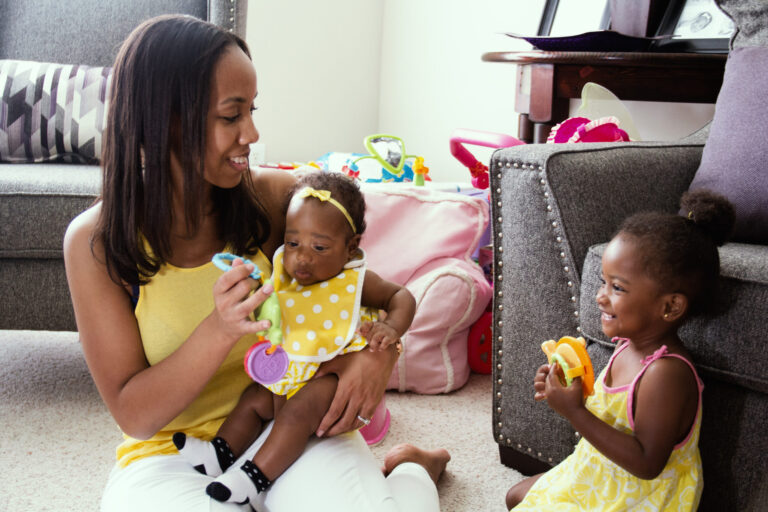Did you know that vocabulary development begins long before children know how to speak? From birth to pre-k, children’s brains develop faster than at any other point in their development. They yearn to soak up all the information in the world around them. Reading, the foundational skill for learning, begins with vocabulary development.
So, what can families and caregivers do during the earliest years to support their child? Research indicates that the strongest predictor of academic success is TALKing with your child. Just as healthy food nourishes a growing child’s body, language nourishes a child’s brain. Quantity and quality of nourishing language, like healthy food, is critical to brain development.
Talk with your child from the moment they are born, in fact you can even start before birth! Engaging with children as conversational partners helps promote vocabulary development, comprehension, and a strong foundation for future success. With every interaction, you have an opportunity to build your child’s brain for reading and learning and building the solid and secure relationships needed to thrive.
Language nutrition is beneficial in any language, so talk with your child in the language that you are most comfortable with. Home languages, for example, are the languages that are most commonly spoken by the members of the family for their everyday interactions in the home.
How do you have conversations with young children? Use the TALK strategy!
The TALK strategy helps to make conversations with children easy and powerful. Each letter in the word TALK stands for something we do in conversation:
Tune In.
Enter your child’s world by tuning in and paying close attention to what they are looking at or doing. Comment on what you observe, and then give them an opportunity to respond, even if they can’t yet communicate with words. Respond quickly to their attempts to engage with you to show that you are interested in them.
Ask Questions.
Asking questions invites your child to engage in a conversation with you and models turn-taking skills. Ask questions based on what you observed when you tuned into what they were doing. For infants and young toddlers, you can ask closed questions such as “Who is at the door?” or “What color is the ball?” As children get older, engage them with open ended questions that develop their vocabulary by requiring more thoughtful answers. Try questions like, “Why do you like playing with your dog?” or “What do you think will happen next?”
Lift Language.
Model the language you want your child to use in the future. Pretend you are a sports announcer and give your child the play-by-play by narrating everything you or your child is doing. Expand on what your child says. Use well-formed sentences with interesting words, gestures, and facial expressions.
Keep it Going.
Keep the conversation going by continuing to tune in, ask questions, and lift language. Keep the focus on what your child is interested in. Each conversation creates more opportunities to use language and expand vocabulary.
Additional Tips
By encouraging your child to find their voice and express themselves, you set the stage for your child’s success from an early age. Here are some additional tips for developing effective communication:
- Gain your child’s attention by using child-directed speech. Child-directed speech is a special form of communication that uses a sing-song, high-pitched voice and exaggerated tones. The variances in the pitch of your voice captures your child’s attention far longer than simply speaking in your normal tone of voice.
- Expose your child to as many words as possible. Every time you talk, you have an opportunity to introduce your child to new words. Describe where you’re going, what you’re doing and what you see. By exposing your child to more words, you help them develop a strong and diverse vocabulary.
- Respond to your child. Even before your child is able to speak, they are able to communicate in different ways. They smile, kick, cry and babble to express their feelings. By responding to your child’s communication, you acknowledge their voice.
- Talk with your child rather than at them. Your child can be a conversational partner from a very early age. Encourage them to speak, experience, understand and use new words every day.
- Get on the child’s level – that way you are talking with them, not at them.
- Embrace your first language. If you speak more than one language at home, talk with your child in the language you are most comfortable with. Children are able to learn more than one language at a time. This does not significantly delay their development or confuse them. In fact, bilingual children demonstrate many cognitive and other benefits.
- Use facial expressions. Adding facial expressions helps teach children the meaning of new words. Smile when you say the word “happiness” or use a shocked look to convey a surprising point in a story.
All adults – parents, caregivers, teachers – can use meaningful conversation as a way to help establish the foundation for educational success in the future. The Cox Campus provides early childhood educators and families practices and resources to bring the power of language to all children, to forever change their futures.



